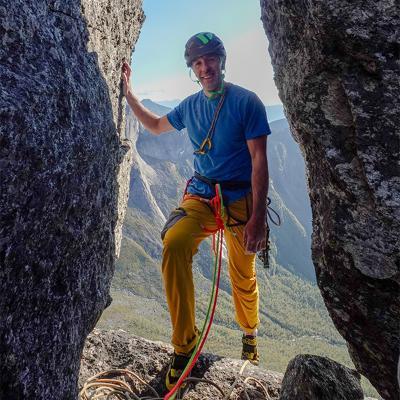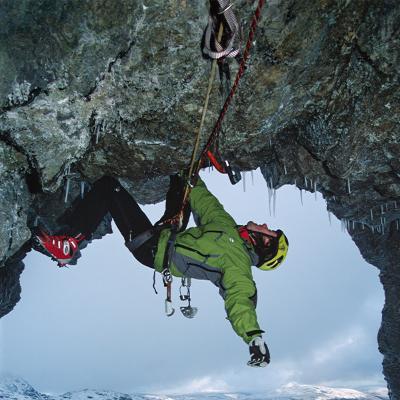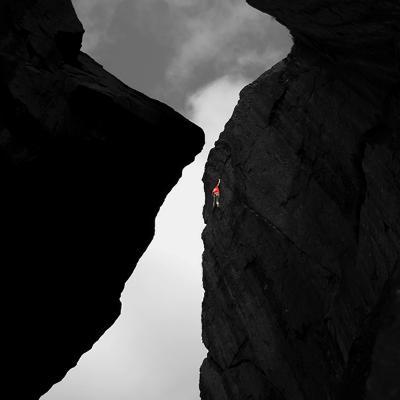
Me by Dave MacLeod
Dave MacLeod (BSc 2002, MSc 2020) is Scotland’s most highly regarded all-round climber, having established and conquered numerous rock climbs here and abroad. He was the first to climb, and name, the route Rhapsody, on Dumbarton Rock on the River Clyde near Glasgow – at the time, the most difficult ‘trad’ climbing route (a style of climbing where climbers place and remove their own protective gear in natural rock features as they ascend, rather than using pre-fixed bolts) in the world. Dave has diversified into writing and film making and, with his Masters in Human Nutrition, is passionate about communicating research findings to the public.
What first sparked your passion for climbing?
One spring, I was exploring outside Glasgow on my bike, and seeing the Highlands in the distance – this big skyline, all covered in snow – it just looked like a big playground. I took a book out of the library which had a bit about rock climbs at Dumbarton Rock, and I got the train there the next day. I saw two climbers on Requiem – which at the time was the hardest rock climb in Scotland and one of the hardest in the world. I was so naive at the time but I just thought, “That looks amazing, I’d love to do that climb.”
You had a terrifying 1,000-foot fall on Ben Nevis – how did this change your outlook?
I was still a teenager when I got caught in an avalanche that went over a cliff, through inexperience, lack of equipment and changing weather. I was falling and thinking, I'm not going to get out of this. It did just give me a sort of sadness, thinking of the rest of my life and what I could have done with it. So it did change my perspective – I don't want to reach that stage without having made the most of my life.
If you’d said to me when I was 14 that I would be a professional sports person I’d have thought that ridiculous. I had no confidence in sport, but climbing showed me very quickly that I actually had some attributes that were well suited to it – that's why I like it so much."

Photo: Calum Muskett
How have you dealt with injuries throughout your career?
I went to my GP with my very first finger injury and he just told me to take months off. When I went back and said it hadn't healed, he just said, try a different sport. I remember walking down the street away from the doctor's surgery in a state of turmoil, thinking, "Is this the end of climbing? I'm 16. Really?” That forced me to look for more specific information and I would actually come into the UofG bookshop, sit in the corner and read sports medicine textbooks, which opened my eyes.
What were the main objectives that motivated you to start writing books and making films?
I started a blog in 2005 just to get into writing, really. It was a way for me to share things that I'd learned which I realised were not obvious to other climbers. These days I do a lot more on YouTube, for a wider audience, and I really like that. I talk about training in general, how to improve your physical and mental performance – but I also like to just show off Scotland, and being outside.
How do you balance your professional climbing career with family responsibilities?
It's challenging – but I think the main strategy is lowering the hurdles. So a great decision I made was to buy my first house next to Dumbarton Rock. My current one is in the Highlands, so I'm in the middle of all this basically endless rock climbing, right on my doorstep. The other day I was climbing in Knoydart. I got up and had breakfast with my daughter before she went to school, got on a boat for ten miles to pretty much the remotest spot in Scotland, did new routes all day and came home in time to see my daughter before she went to bed.
You've undertaken some unique dietary experiments. What’s been the wildest, and what insights have you gained from these experiences?
I did an experiment of going to a very well-known fast food outlet and eating only the burgers – just the meat – and performing extremely well, having excellent all-round health and being very lean. But I would say that the most extreme diet I've done was almost vegan – apart from milk in my tea. Life wouldn't be worth living without tea with milk, so I didn't go that far! When I was doing that experiment, I was able to achieve leanness, but not in a good way. I felt constantly hungry, on an energy rollercoaster. To be perfectly honest, it wasn't great for my mental health. I could feel myself getting irritable, and I’m not normally like that. Even my wife was saying, how long are you doing this for?!
In the final analysis – what has climbing given you?
Climbing's given me many great adventures to places that are beautiful, spectacular and wild. It's given me exhilaration and focus, and it's helped me to realise that I've been capable of much more than I ever thought. It's given me friendships and connections that might be stronger than I could have got in other aspects of life, because you’re sharing a very challenging, maybe scary experience with someone in the mountains.
You have a shared purpose, to survive the climb that you're doing, and that creates a bond which is really special. That’s important for me because I was and still am quite an introverted person."

Photo: Dave Cuthbertson
What other hobbies or pastimes do you enjoy?
I often sit and watch nutrition and biochemistry lectures on YouTube. That is entertainment for me! And recently, I’ve picked up the guitar, which I played for six months when I was 14, until I started climbing. I am absolutely terrible at it – my fingers are very strong but also very stiff, so certain chords are just impossible – but I enjoy it as a learning challenge.
What is your happiest memory?
I'm picking one of many, but I remember doing a new route on Ben Nevis in winter, which I'd tried many times before and then went one day with a friend, and unexpectedly did it. But we ended up having this massive adventure to actually complete the climb. We were climbing by feel in the dark as my friend had forgotten his head torch – and then the clouds suddenly parted below us. It was a full moon, so instantly the whole of the upper half of the mountain was just lit up by that special kind of light. Ben Nevis in winter, caked in snow and ice, just looks beautiful.
Where is your favourite place in the world?
Where I live, in Lochaber [in the Scottish Highlands]. I live seven minutes from Ben Nevis, which has endless climbing. There's still a lot of unclimbed stuff to do up there and it's a lovely place – completely different in character in summer and winter. But within an hour in any direction, there's all of these different climbing areas. I can go to Skye for the day. I can go to the Small Isles, the Arisaig coast, Glencoe or the Cairngorms.
I stopped flying about ten years ago. I just felt like I can't really be sad about the loss of snow and the change in the climate and then jump on a plane to the mountains just to entertain myself."

Photo: John Watson
What always lifts your mood?
Two things that go together – cold, fresh wind in my face on a mountain and the feeling of friction on rough rock in cold, dry conditions.
How would you spend the perfect day?
I'd have breakfast with my family, then a short drive to some unclimbed rock and do hard new routes all day. It doesn't actually matter if I succeed or fail – I always discover something new about the movement on a boulder or a climb that I'm trying. Then I'd drive back home to spend the evening with my family again. That day I've just described is probably about 100 days of the year.
Memories of Glasgow
University just felt like a way of life – a first ‘career’– and I didn't want it to end. So the idea of progressing straight to doing a master's just seemed natural. I did exercise science, then came back much later to study nutrition. I was so fascinated by the subject and there were lots of questions that I wanted to answer, to understand it better myself.
The GU Mountaineering Club was the mainstay for me – I made lifelong friends there and had loads of fun on the meets, especially in winter – going up to the Highlands and staying in some of the village halls, climbing on snow and ice in all kinds of weather and just having great adventures.
I have many fond memories of my time at UofG. I enjoyed the lectures, and it was an exciting time in my life where it was dawning on me that some really big dreams of climbing were actually possible.
I always remember coming back for the first day of my final year. We got a bit of a pep talk – were told, well, you’ve had a good time in your first three years; now you’re going to have to knuckle down a bit. I took this very seriously. I thought I'd have to put the idea of doing an E9 [an ‘Extreme’ grade of rock climb] on the back burner. Nobody had climbed an E9 in Scotland yet, but I was trying one at Dumbarton Rock. But a week later, I’d done it. I didn't actually realise how close I was to doing it – it was funny how it crept up on me.
Dave is the author of several books, including the autobiographical Moving The Needle (2024), and is keen to publish one on nutrition. His current project is creating a video course on training for older climbers and the challenge of maintaining or improving athletic performance at an advancing age.
Main Avenue masthead image of Dave: Tim Emmett
Main image above: Chris Prescott/Dark Sky Images
QUICKFIRE
Greatest achievement?
Being stronger at 47 than I was at 27.
Biggest hero?
A nutrition researcher called Amber O'Hearn who I think is a really great thinker.
Biggest challenge?
Gaining the confidence to realise that I could do many of the things in climbing that I wanted to do.
Most-played artist?
Martyn Bennett.
Biggest extravagance?
Very expensive camera lenses. I do a lot of stuff on YouTube, and I like showing off the mountains at their best.
Watch above: Dave shares some good news from the University.
Dave’s tips for optimum nutrition
1. Experiment with a different approach – thinking about what you eat rather than how much you eat. If you go into the supermarket, for example, stay on the periphery – just avoid the big chunk in the middle with all the packaged boxes.
2. Resist the temptation to follow the current trend of avoiding animal-based foods, because they are very nutritious.
3. For the general public, if you want to avoid weight gain, I think there's a number of approaches that work if you just go in any direction away from the standard western diet.
4. The bodybuilder route of very high protein and fibre intake, the vegetarian approach of high fibre and carbs, or the keto approach of eating just protein and fat all help to regulate appetite relative to the western diet. The best choice will be one you can eat for the long term and cover key nutrients.
5. Moderation has been a popular concept in nutrition but even disciplined athletes struggle to sustain it. If moderation gives you the results you are looking for, great. If not, don’t be afraid of abstinence from certain types of food that trip up adherence.
This article was first published in October 2025.

